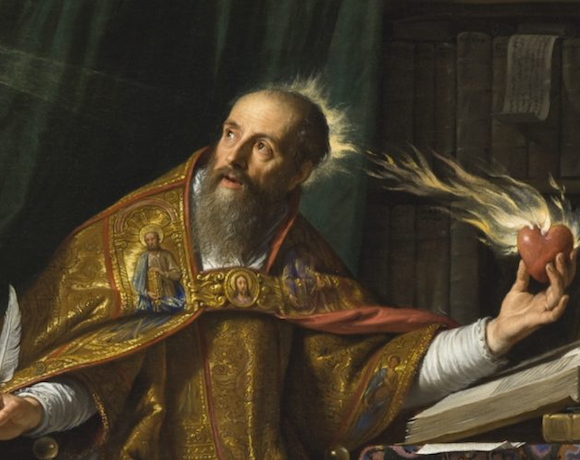
Doctors of the Church: Augustine
By Br Andy Opsahl | Given that we here at Blackfriars chose to blog during this academic term on Doctors of the Church, writing a post on Saint Augustine, one of Christian theology’s most important voices, was a must! Saint Augustine lived a life of profound searching, both of his own soul and of truth in general as his immense body of theological work reveals, especially his seminal Confessions.
Augustine’s philosophical-theological writings on numerous questions became integral to the foundation of Christian doctrine. For example, at the core of our catechism’s discussion of Original Sin is Augustine’s presentation of Original Sin as an inborn defect of human nature caused by the sin of Adam and Eve and passed down through reproduction to all of humanity. The guilt of Original Sin, Augustine taught, was not due to anything the person who had Original Sin did but rather due to the fact that with Original Sin came an inherited predisposition toward sin. Before this change to human nature occurred as a result of the first sin, human beings enjoyed a special grace by which human passions functioned with fixed obedience to the human will and consequently were unable to pull a person’s will toward sin. While Baptism cleanses a person of the guilt of Original Sin, the person’s soul retains the effects of it, including the ability of those passions to do battle with a Christian’s good will. Ultimately, Augustine believed, a Christian needed to rely on grace in order for his or her will and passions to work together in the perfectly harmonious way God designed for them. It is a process that begins with a Christian’s Baptism and culminates after that Christian’s death when he or she participates fully in Christ’s Resurrection. Given the essential importance of grace in all of that happening, it should not surprise us that the topic of grace was especially important to Augustine’s theological writings. He fought vigorously against followers of a heresy called Pelagianism that deemphasised the role Baptism and grace played in a person’s ability to live a Godly life.
Augustine’s views on Original Sin and grace, as well as questions regarding predestination, the existence of evil, the suffering of the righteous, the conflict between free will and divine omniscience, and numerous other matters can be found in his great work, City of God, widely deemed a cornerstone of Western thought. Many view the Confessions as the first Western autobiography, which had a seminal influence on spiritual writers who followed him for centuries. Also important was On the Trinity, On Christian Doctrine, and numerous others, many of which are available for free online.
Approaching Augustine can seem a little overwhelming, given the vast scope of his thought. I recommend starting with his Confessions. It is a classic that influenced spiritual writers heavily ever since. Also, it is organised into many brief, focused chapters. It gives a vivid sense of the search for truth about himself and God that characterised his life serves as a valuable example for all of us as we navigate our own journeys toward full union with God.
Also in the Doctors of the Church series:
- St Ambrose, by Br Vincent Antony Löning
- St Athanasius, by Br Thomas Thérèse Mannion
- St Basil, by Br Vincent Antony Löning
- St Gregory the Great, by Br Albert Robertson
- St Jerome, by Br Joseph Bailham
MORE ON: SAINTS
Sorry, the comment form is closed at this time.



A Website Visitor
Beautifully written and an excellent way into studying this great Doctor of the Church